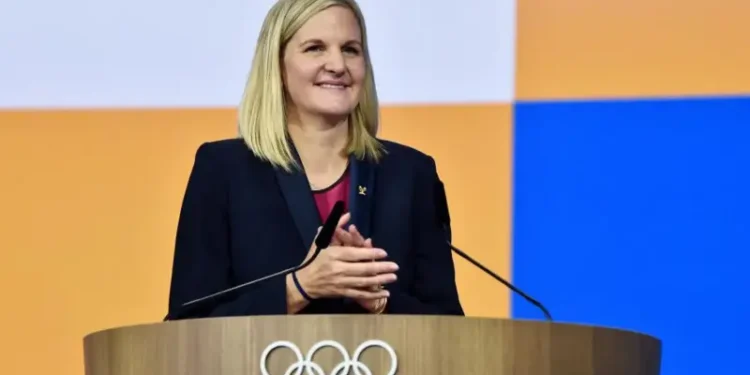Zimbabwe’s sports minister, Kirsty Coventry has been elected as the new president of the International Olympic Committee (IOC).
The 41-year-old former swimmer, who won two Olympic gold medals, replaces German Thomas Bach – who had held the role since 2013 – and becomes the first woman, the first African and the youngest person to hold the role.
World Athletics boss Lord Coe was among the favourites to win Thursday’s election in Greece, but Coventry secured an absolute majority of 49 of the 97 votes available in the first round of voting.
Runner-up Juan Antonio Samaranch Jr won 28 votes while Coe secured eight.
Coventry, who already sits on the IOC executive board and was said to be Bach’s preferred candidate, is the 10th person to hold the highest office in sport and be in post for at least the next eight years.
Coventry has won seven of Zimbabwe’s eight Olympic medals – including gold in the 200m backstroke at both the 2004 and 2008 Games.
“The young girl who first started swimming in Zimbabwe all those years ago could never have dreamed of this moment,” said Coventry, who beat six male rivals to win the vote.
“I am particularly proud to be the first female IOC president, and also the first from Africa.
“I hope that this vote will be an inspiration to many people. Glass ceilings have been shattered today, and I am fully aware of my responsibilities as a role model.”
During her election campaign Coventry pledged to modernise, promote sustainability, embrace technology and empower athletes.
She placed particular emphasis on protecting female sport, backing a blanket ban of transgender women from competing in female Olympic sport.
Coventry has faced criticism in Zimbabwe in her capacity as sports minister since 2018, but defended her association with the government of controversial president Emmerson Mnangagwa.
Governmental interference in football resulted in FIFA banning Zimbabwe from international football in 2022, while last year the United States imposed sanctions on Mnangagwa and other senior officials for corruption and human rights abuses.
The presidential vote took place at a luxury hotel in a seaside resort about 60 miles south of Olympia, the birthplace of the ancient Games.
IOC members had to hand in their phones before a secret electronic ballot at about 14:30 GMT.
The campaign process restricted candidates to 15-minute presentations at a private event in January, with media barred and no scope for questions from members afterwards.
Endorsements by members were not allowed, nor was any criticism of rival candidates, meaning behind-the-scenes lobbying played an important role.
‘A landmark moment for world sport’ – analysis
This is a landmark moment for the IOC and for world sport.
As the first woman to hold sport’s most powerful role, Kirsty Coventry is a trailblazer. But as a member of its executive board, she is also an IOC insider.
Coventry was seen as the preferred candidate of outgoing president Thomas Bach and her convincing victory after a low-key campaign will be seen as a reflection of his influence.
IOC members were clearly untroubled by her close association with the controversial Zimbabwe government.
Coventry will assume her new role in June at a critical time for the Olympic movement.
She will have to deal with a tense geopolitical landscape, the potential reintegration of Russia, and US President Donald Trump before the 2028 LA Games.
She will also have to tackle issues such as gender eligibility, climate change, and ensuring the Games remain relevant going forward.
(BBC)








